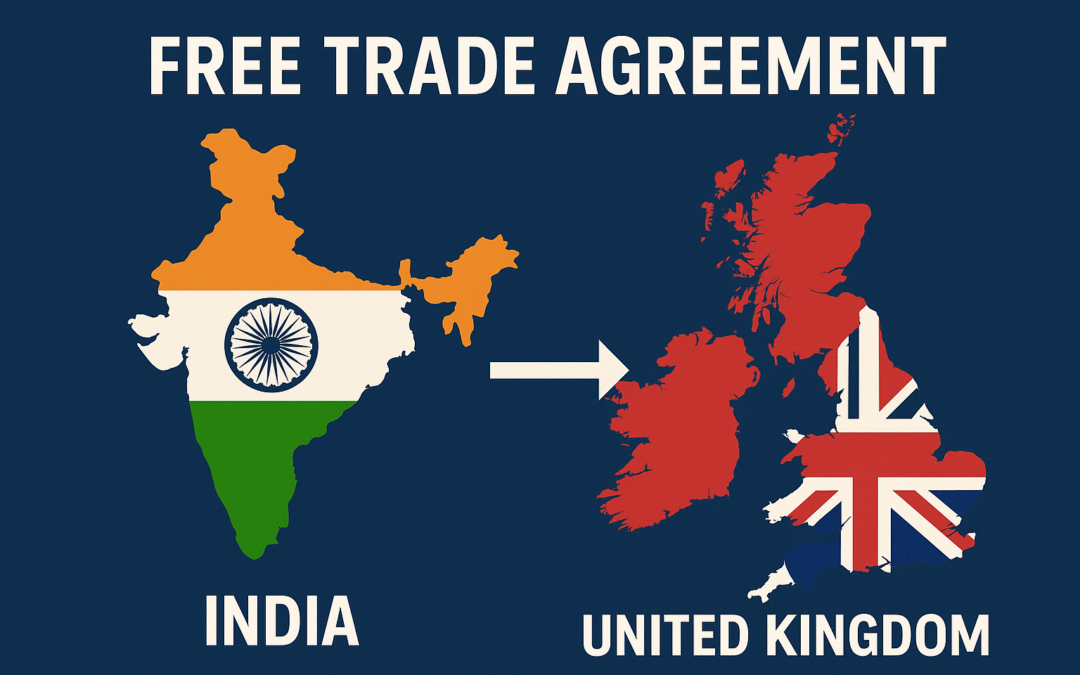
Introduction
The proposed India-UK Free Trade Agreement (FTA) is shaping up to be a historic economic milestone. Aimed at boosting bilateral trade, reducing tariffs, and enhancing market access, the India UK Free Trade Agreement is expected to open new opportunities for Indian exporters, startups, and service providers. As of mid-2025, negotiations are nearing completion, with implementation likely in 2026. But how will this agreement impact Indian businesses in real terms? Let’s find out.
Background: India and UK Trade Relations
India and the United Kingdom share a long-standing commercial relationship. After Brexit, the UK began looking for new trade partners outside the EU. India, with its massive market and economic potential, became a key focus.
- Trade negotiations began in January 2022
- The goal is to reach $100 billion in bilateral trade by 2030 (currently ~$36 billion)
- 14 rounds of talks have already taken place
#WATCH | London: India and UK sign the Comprehensive Economic and Trade Agreement.
(Video: ANI/DD News) pic.twitter.com/Qnrck6lDWb
— ANI (@ANI) July 24, 2025
Major Benefits for Indian Businesses
1. Removal of High Tariffs
The FTA proposes to remove tariffs on over 90% of Indian goods exported to the UK. Key beneficiaries:
- Textiles
- Leather products
- Pharmaceuticals
- Agricultural products (like rice, spices)
This means lower export costs and better pricing competitiveness in UK markets.
2. Expanded Services Market
India excels in IT, finance, education, and healthcare services. The FTA is expected to:
- Simplify visa norms for Indian professionals
- Recognize Indian degrees and certifications
- Enable joint ventures between Indian and UK firms
3. Boost for Startups and MSMEs
Digital trade and data flow facilitation will benefit Indian startups, especially in fintech, edtech, and SaaS. MSMEs can:
- Gain easier access to UK buyers
- Benefit from relaxed compliance
- Receive digital support from government export councils
4. Pharma and Healthcare Exports
With harmonized regulations and faster UK drug approvals, Indian pharma companies will see:
- Increased generic drug exports
- Expansion of medical devices
- Joint R&D and clinical trials
5. More Foreign Investment
The FTA provides a dispute resolution framework and legal protections for UK investors, which could encourage:
- Inflow of FDI into Indian sectors like education, infra, and clean energy
- Strategic partnerships in AI, green tech, and logistics
Challenges and Concerns
1. Competition from UK Imports
Industries like dairy, food processing, and alcoholic beverages in India could face:
- Market saturation
- Pricing pressure
- Threat to local producers
2. Compliance with UK Standards
Indian businesses, especially small ones, may struggle to:
- Meet UK regulatory standards
- Manage documentation and certifications
- Adapt packaging and labeling requirements
3. Labor and Environment Clauses
The FTA includes strict clauses related to:
- Labour rights
- Environmental protection
- Carbon footprint reporting
Businesses must be ready to adopt sustainable practices.
Voices from the Industry
- CII and FICCI: Welcomed the FTA for opening high-value export opportunities
- Pharma Exporters Council: Hailed regulatory cooperation and expedited approvals
- Textile Associations: Encouraged by duty-free access for Indian garments
- Dairy Producers: Requested protection from UK cheese and milk product imports
What Should Indian Businesses Do Now?
Here’s a checklist for Indian entrepreneurs and exporters to stay ahead:
✅ Evaluate product-market fit in the UK
✅ Upgrade processes to meet UK standards
✅ Learn about documentation and tariffs
✅ Use services from FIEO and DGFT
✅ Attend government webinars and trade fairs
Indian Government Support Initiatives
- DGFT (Directorate General of Foreign Trade): Will assist with documentation, training
- SEZ and Export Councils: To offer incentives for exploring UK market
- Startup India: Facilitating international exposure and partnerships
Timeline Snapshot
| Milestone | Date |
|---|---|
| Negotiations started | Jan 2022 |
| Draft agreement finalized | Mid-2025 |
| Expected implementation | Early 2026 |
| Target bilateral trade value | $100 billion |
FAQs
Q1: Will all Indian products become duty-free in the UK?
Not all, but 90%+ goods are expected to benefit. Some sensitive categories may be phased.
Q2: How will it impact job creation in India?
More exports and foreign investment are expected to create lakhs of new jobs.
Q3: Is this beneficial for small businesses too?
Yes, MSMEs will gain easier market access, reduced paperwork, and digital trade support.
Q4: Is the agreement final?
Not yet. Final signatures and implementation are expected in early 2026.
Q5: Where can I get updates?
You can visit:
Conclusion
The India-UK Free Trade Agreement is not just a policy document — it’s a gateway for Indian businesses to go global. With reduced tariffs, improved service access, and better regulatory cooperation, this deal opens a new chapter in India’s trade diplomacy.
However, success will depend on preparedness and policy support. Exporters and MSMEs should actively prepare to leverage this historic opportunity.
Stay informed, stay competitive!
You can also check other blogs on www.Scrollinfo.in

